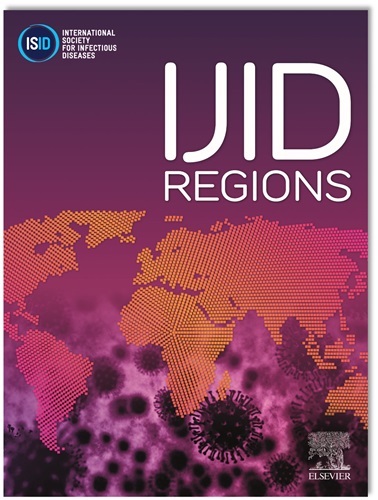评估流动实验室中的快速分子测定,以改进孟加拉国的登革热诊断。
IF 4.8
2区 医学
Q1 INFECTIOUS DISEASES
引用次数: 0
摘要
目的:近年来,登革热在登革热流行地区已成为严重的健康威胁。然而,由于登革热连续感染的诊断准确性不一致,因此有必要改进检测方法,以确保对登革热病例进行有效管理。在此,我们评估了一种便携、快速、灵敏的分子检测方法--逆转录酶重组聚合酶扩增检测法(RT-RAA),利用移动手提箱实验室检测孟加拉国登革热疑似病例的感染情况:方法:364 名登革热疑似病例被纳入研究。登革热病例由 NS1 RDT、IgM RDT、qRT-PCR 和 RT-RAA 检测四项检测中任何一项的阳性结果确认。IgG RDT用于区分原发性和继发性登革热感染:结果:在 364 例疑似登革热病例中,320 例为确诊登革热病例,其中 55.94% 为原发性感染,44.06% 为继发性感染。实验室结果显示,在原发性登革热中,RT-RAA(78.8%)和 NS1 RDT(77.1%)的阳性率相当,其次是 qRT-PCR(57.5%)和 IgM RDT(12.8%)。在继发性登革热中,RT-RAA 的阳性率更高(76.6%),超过了 RT-PCR(60.3%)、NS1 RDT(27%)和 IgM RDT(24.8%)。RT-RAA与NS1 RDT相结合可检测出89.95%的原发性登革热感染者和81.56%的继发性登革热感染者:研究结果表明,将 RT-RAA 与 NS1 RDT 相结合可显著提高登革热的检出率,尤其是对继发性感染的检出率。本文章由计算机程序翻译,如有差异,请以英文原文为准。
Evaluating a rapid molecular assay in a mobile laboratory for improved diagnosis of dengue in Bangladesh
Objectives
Dengue emerged as a significant health threat in endemic regions in recent years. However, inconsistent diagnostic accuracy in sequential dengue infections necessitate improved testing methods to ensure effective management of dengue cases. Here, we evaluated a portable, rapid, and sensitive molecular assay—reverse transcriptase recombinase polymerase amplification assay (RT-RAA)—utilizing a mobile suitcase laboratory to detect infections in suspected dengue cases in Bangladesh.
Methods
A total of 364 suspected patients with dengue were enrolled in the study. Dengue cases were confirmed by a positive result from any of the four tests: non-structural protein 1 (NS1) rapid diagnostic test (RDT), immunoglobulin (Ig) M RDT, quantitative reverse transcriptive-polymerase chain reaction (RT-PCR), and RT-RAA assay. IgG RDT was performed to differentiate between primary and secondary dengue infections.
Results
Of 364 suspected cases, 320 were confirmed dengue cases, with 55.94% classified as primary and 44.06% as secondary infections. Laboratory results showed comparable positivity rates between RT-RAA (78.8%) and NS1 RDT (77.1%) in primary dengue, followed by quantitative RT-PCR (57.5%) and IgM RDT (12.8%). RT-RAA demonstrated superior positivity rates in secondary dengue (76.6%), surpassing RT-PCR (60.3%), NS1 RDT (27%), and IgM RDT (24.8%). Combining RT-RAA with NS1 RDT detected infections in 89.95% primary and 81.56% secondary dengue.
Conclusions
The findings suggest that complementing RT-RAA with NS1 RDT could significantly improve dengue detection rate, particularly, for secondary infections.
求助全文
通过发布文献求助,成功后即可免费获取论文全文。
去求助
来源期刊
CiteScore
18.90
自引率
2.40%
发文量
1020
审稿时长
30 days
期刊介绍:
International Journal of Infectious Diseases (IJID)
Publisher: International Society for Infectious Diseases
Publication Frequency: Monthly
Type: Peer-reviewed, Open Access
Scope:
Publishes original clinical and laboratory-based research.
Reports clinical trials, reviews, and some case reports.
Focuses on epidemiology, clinical diagnosis, treatment, and control of infectious diseases.
Emphasizes diseases common in under-resourced countries.

 求助内容:
求助内容: 应助结果提醒方式:
应助结果提醒方式:


